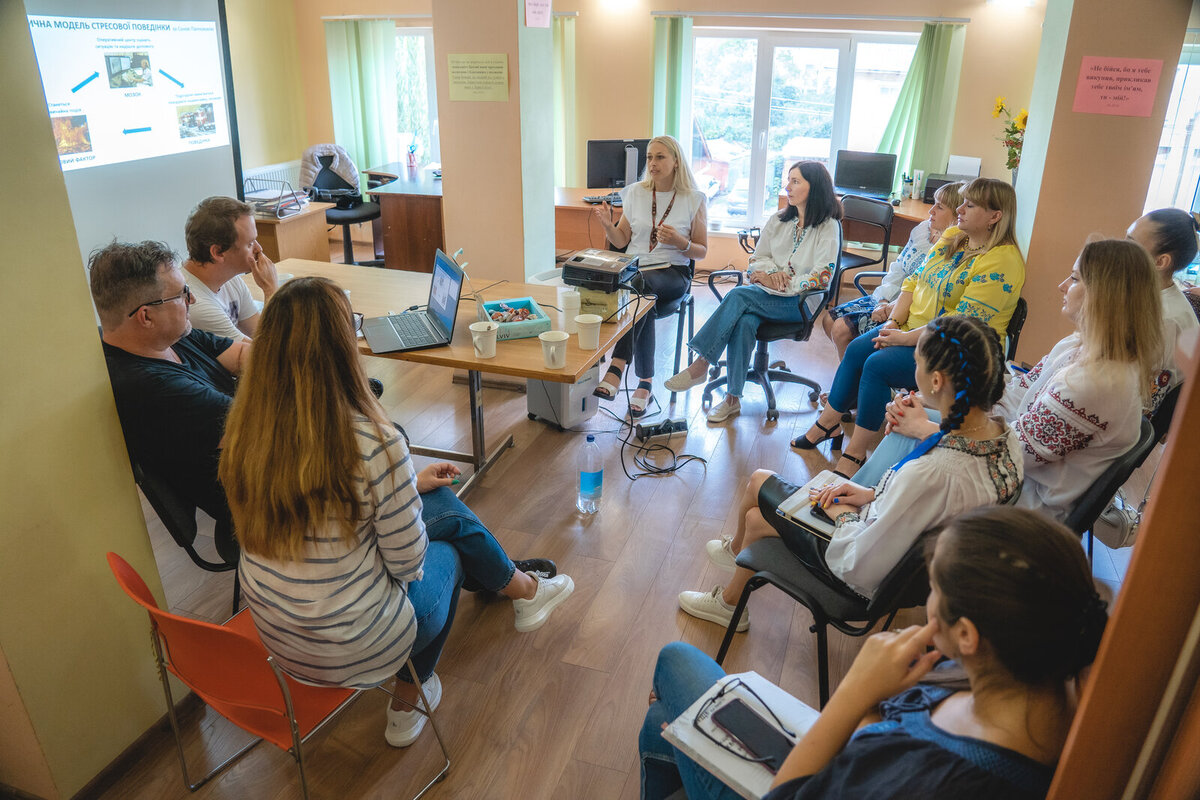Ruins, death, rapes, cruelty, torture, personal losses, constant danger, and fear. Ukrainians have been living in the horrors of the war for 8 months. All these terrible things are not something people can easily deal with. Sometimes it is very hard for them even to find a reason to live. That is why victims of war need professional help to be able to continue their normal life. Caritas Czech Republic provides professional training for psychologists and social workers for the local Caritas Ukraine team.
The challenge to ask for a help
It is not always easy for people to ask for such kind of help. Every person comes easily for food, because, everyone can clearly recognize the feeling of hungry. But people rarely come for psychological support by themselves. Because very often they cannot admit or even understand, that they need this help.
“It is very hard to talk about mental pain,” a psychologist Ulyana Kotsemira told us. She is a member of the Caritas Ukraine team, so she has been helping forcibly displaced Ukrainians since the beginning of the war.
“The first reason why it is difficult for people to turn to us for help is that the natural human reaction is to provide basic needs in the first place: food, shelter, and safety. And maybe later people think: 'How do I feel?',” Ulyana explains. “Another reason is that Ukrainians were not used to going to a psychologist in general. Many people in our country still think that if you go to a psychologist, it means you are not normal, you are crazy. Although we overcame this stereotype pretty successfully in recent years, it still appears. So, we have to initiate the conversation, show genuine interest in the person, and even become a friend with those who potentially need our help.”
The pain and the grief which is hard to describe
The people’s stories Ulyana told us are really shocking. They have lost completely everything, so the trauma they are going through is just unbearable.
“We met a woman at one of the outings in the Drohobych district. She was in a very difficult emotional state because just a few days ago she was informed that her youngest son had died on the battlefield. And this son was not the first one she has lost. Her eldest son died before the war. While I was talking to her, I figured out that her sister, who remained in the East of Ukraine, has disappeared,” Ulyana tells the story and adds that the women experienced huge stress after stress.
“She is broken and she has lost the ground under her feet. She feels that she is a stranger here, everything is foreign and unfamiliar to her. There is no home for her…,” Ulyana continues and says that even though this woman was given a place to live, it does not feel the same for her. “As she told me: 'It's not mine! Yes, it's good that it's not dripping on my head, it's good that I have something to eat, but the pain and the grief I feel because of losing people I loved and the whole my life I cannot describe'. Ulyana continues and says that she gave the women her personal phone number and told her to call her anytime she needs support. “She actually does call, which is good. Because the very few consultations we have can’t stabilize her and help her overcome this condition,”.
We need to know how to help
Our partner Caritas Ukraine works with war victims and provides them with psychological support. Our colleagues have a team that is ready to help people in need. But not all of them are professional psychologists, and not all have an experience in the crisis intervention area.
For example, Olena Orlova from Kharkiv. She is a forcibly displaced person, but she also wants to help people who went through the same pain she did. In Kharkiv, she was working as a district medical registrar at the local polyclinic. The 42-years-old woman escaped from her native city together with her son at the time Russia was strongly bombing the city with rockets. Her son is only 11 years old.
Crying every day
“We stayed home as long as we could. My friend brought me some food because I was very afraid to leave the house. Over time, we realized that it was getting worse. Even more shelling and rockets. So, we decided to run away,” Olena recalls “I just took the bag, my child, and went to the railway station. I was terrified. You know, it was like in the movies about war. We barely fit into the train carriage. There were 17 of us in one compartment. We were driving from Kharkiv to Lviv for 24 hours. We almost didn’t have food with us. When I came here, I cried every day. I couldn't distract myself with anything and even I couldn't eat,” Olena said to us very emotionally.
She has been living in the Lviv region for almost half of a year, but of course, she still speaks about war horrors with tears in her eyes. Olena says that psychologists from Caritas Ukraine team helped her a lot to overcome her trauma. Now she became a Caritas team member as well and she wants to help people like herself. But of course, she has no appropriate experience, so, to get one, she attended our training.
The training for those who want to help others
Caritas Czech Republic is organising training for psychologists and social workers and started training people like Olena and providing them with the necessary knowledge.
“I am very glad that I came. Because any conversation with a psychologist is an excellent experience, it is new knowledge. What is important for me is to hear how to deal with my own pain. You know, I can handle another person’s pain, I can talk to another person, calm her down, treat her with something, advise something. But it is hard to handle myself, and my own emotions. If there is someone who can help me, that is great. Because I need to continue helping people like me,” said Olena.
Crisis intervention
We involved psychologists from the fire rescue service in the Czech Republic and organized training for the Caritas Ukraine team. One of the lecturers was Tomáš Adámek. The Czech Republic accepted many Ukrainian refugees in the first days of Russian aggression and the firefighters were a part of the team who was taking care of the refugees. Mrs. Adamek was leading a phycological support team and he was responsible for delivering psychological first aid to the victims of the war.
“Our training is about our experience, our work with Ukrainian refugees. The key topic was crisis intervention. We were talking about how to stabilize people who are affected by a sudden accident or sudden disaster,” Tomáš Adámek describes the purpose of the training. “The other topic was stress. How do people feel when they are distressed? What is going on inside the person who has faced a difficult life situation? We shared our experience with the participant about ways of providing psychological first aid. We gave them our instruments and tell them how to work with trauma,” adds Tomáš Adámek.
Self-care is the hardest one
Another important topic of the training was resilience self-care: How to be strong as a crisis helper? How to take care about your own mental health, and how to stay emotionally stable in the horrors of war.
“At first, I was afraid of going to Ukraine,” Tomáš Adámek says openly. “But my wife supported me a lot. She gave me the feeling of safety. She said: 'If you feel that you should be there is this dangerous time then just do it, please'. She supported me, even though she was also scared. And I am glad that I came because I see a huge added value that we brought here at this time”.
The help must be delivered in time
We can see burned buildings and destroyed cities. But we cannot see destroyed souls. That is why people very often just ignore their mental and emotional state. But psychological support is very important. The sooner a traumatised person can get it, the better. Because if the help is not given in time, the symptoms and consequences will deepen and hurt the person more. Caritas Czech Republic is very glad to be a part of this help. The more Ukrainians can receive urgent psychological help, the fewer long terms symptoms Ukraine will have to deal with in the future.
This help is possible thanks to our donors: Ministry of Foreign Affairs of the Czech Republic, Trocaire, and Irish Aid.












